Closing Event and Showcase—New Economy Forum: Fighting Corruption with Technology at the 2021 Annual Meetings
The IMF Anti-Corruption Challenge concluded with the final event at the 2021 Annual Meetings. The four challenge winners presented the progress, impact, and learnings from implementing their pilot projects over the past year. The Challenge offered an opportunity for the Fund to work closely with other international institutions, civil society, and private sector on practical solutions to fight corruption. Now that the Challenge has concluded, the IMF will continue its engagement to find innovative solutions to improve governance and fight corruption.
Click on each project below to watch a short summary video:
Meet the Four Winning Teams of the IMF’s Anti-Corruption Challenge
Joining the Dots with Public Officials: Cross-Matching Beneficial Ownership and Financial Disclosures Data to Identify Red Flags
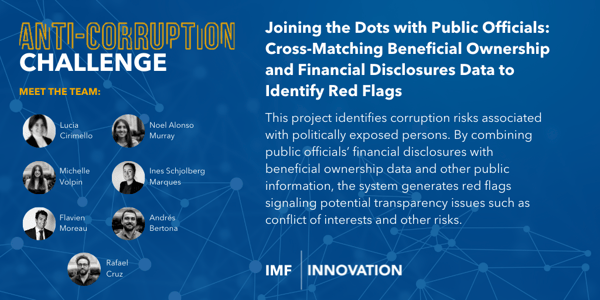
The project team is developing a dynamic tool capable of incorporating different datasets and integrating them into the system's automated forms of data collection and learning programming logic (machine learning). In this way, within a gradual curve of complexity, their system will be able to identify new risks of corruption by taking into account the rules of analysis and patterns of the red flags already detected and registered in the database’s historic records.
Public Procurement Corruption Risks: Harnessing Big Data for Better Fiscal Governance and Growth
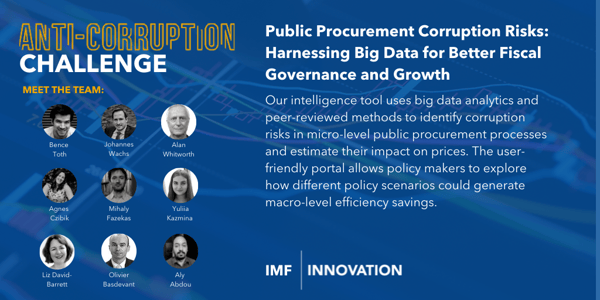
The project team will deliver a dashboard covering 30+ countries similar in structure to the pilot dashboard. In addition, the team will prepare an expanded policy note or a working paper on the methodology and results.
Enhancing Transparency in Wage Bill Practices: Leveraging Blockchain
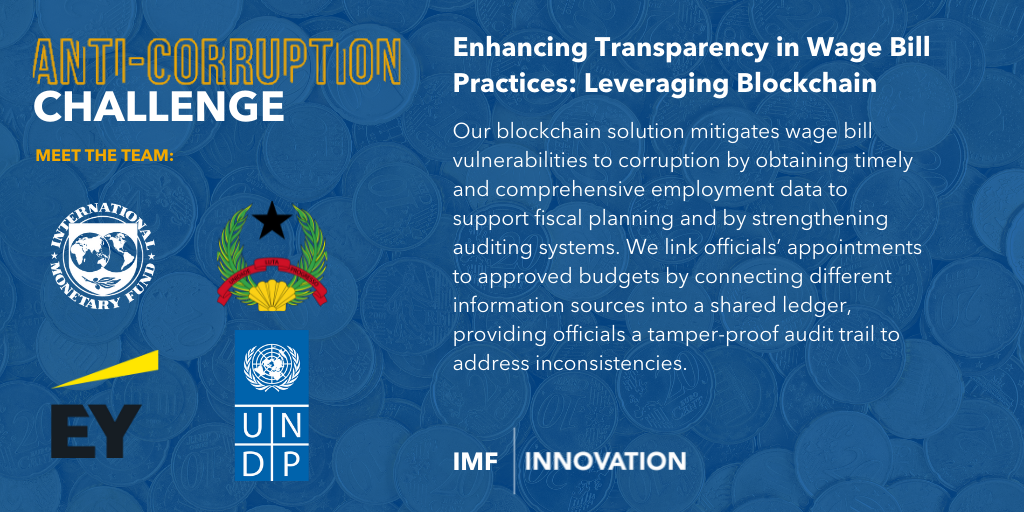
The Blockchain project in Guinea-Bissau led by the IMF in collaboration with Ernst and Young, the authorities, and UNDP, will enable access to reliable and timely information on personnel and salaries to make better decisions, track effective outcomes, and help close gaps on the inefficiencies identified in the wage bill.

Optimizing the Detection of Beneficial Ownership of High-Risk Firms in Brazil
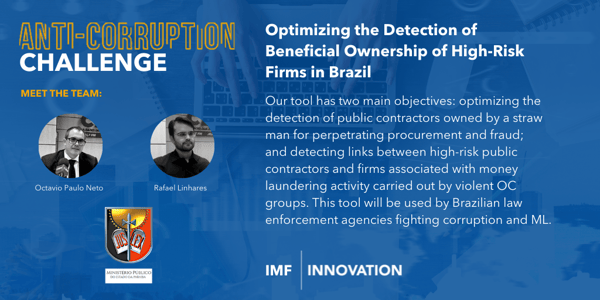
The project team is creating a solid and actionable prototype tool for automating and optimizing the detection of shell companies bidding in public procedures and its potential beneficial owners in Brazil.

Sponsors & Partners:
This challenge is organized by the IMF Innovation Lab (iLab) and Legal Department (LEG) in partnership with the Fiscal Affairs, Finance, Strategy, Policy and Review, Institute for Capacity Development, and Communications departments.
This challenge is sponsored by the Swiss State Secretariat for Economic Affairs (SECO).

IBM Research is a technical partner for this challenge.
Innovation at the IMF:
Learn more about innovation at the IMF.
For more information about the winning teams, contact innovation@imf.org
Update November 2020: the results are in...
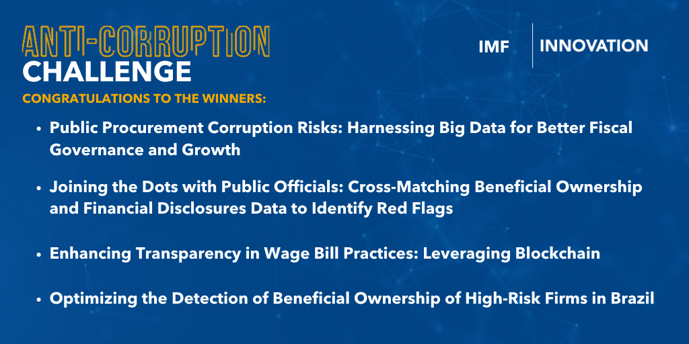
Watch the replay of the IMF Anti-Corruption Challenge Pitch Event below.
Livestream
Program
Moderator: Tristan Walker, Innovation Chief, IMF
Opening Remarks by the Managing Director highlighting the importance and impact of corruption and the Fund’s recent work on governance.
Following opening remarks, Rhoda Weeks-Brown will set the stage, provide information on the challenge process and introduce the judges consisting of several Heads of Departments and partners from CSO organizations, WBG and academia. Each team will show a pre-recorded pitch video (5-minutes each) followed by a live Q&A opportunity for the judges.
Download the Anti-Corruption Challenge Summary Document
Judges:
- Jihad Azour, Director, Middle East and Central Asia Department, IMF
- Vitor Gaspar, Director, Fiscal Affairs Department, IMF
- Ceyla Pazarbasioglu, Director, Strategy Policy and Review Department, IMF
- Rhoda Weeks-Brown, Chair, General Counsel and Director, Legal Department, IMF
- Alejandro Werner, Director, Western Hemisphere Department, IMF
- Sean Hagan, Visiting Professor of Law, Georgetown
- Warren Krafchick, Executive Director, International Budget Partnership
- Ed Olowo-Okere, Global Director for the Governance Practice, World Bank
- Paul Maassen, Chief of Country Support, Open Government Partnership
- Rosmarie Schlup, Head, Macroeconomic Support Division at SECO, Sponsor
- Mark Weber, Strategy and Operations Lead, MIT-IBM Watson AI Lab, Partner
See Top 8 proposals:
Topic: Enhancing Governance in Public Finance: The Role of Data and Technology
Harvesting open data for early detection of conflicts of interest in public procurement
Our initiative focuses on cross-matching data on public procurement, political party financing and company ownership to increase transparency and accountability, by simultaneously increasing access to information, preventing corruption and improving data literacy. To ensure the applicability of our solution, activities are piloted in Estonia and Latvia, with the aim to expand to advanced and developing countries later on.
Corrupt Wage Bill Practices in Fragile States: A Blockchain Solution for Guinea-Bissau
Our proposed solution pertains to identify efficiency gains and reduce the opportunities for corruption around the wage bill by:
Obtaining timely and comprehensive wage and employment data to support fiscal planning and forecasting; Strengthening payroll and auditing systems; Reducing the excessive and opaque use of non-payroll payments.
Topic: Tackling Corruption: Financial Disclosure Systems for Public Officials
Joining the dots with PEPs: using BO transparency and FD systems to identify red flags
This project identifies corruption risks associated with politically exposed persons. By combining public officials’ financial disclosures with beneficial ownership data and other public information, the system generates red flags signaling potential transparency issues, like conflict of interests and other risks. While the pilot focuses on Colombia’s extractive sector, this data verification mechanism can be applied across other countries and sectors.
Public Officials Risk Index (PORI)-A tool to combat corruption using disruptive technologies
Many countries lack a well-functioning financial disclosure system. To overcome this, we are proposing a new standardized risk index for public officials, the Public Official Risk Index (PORI). Through this project, we will develop an E-Filing system for financial disclosure, advanced data analytics for risk profiling, and will establish a risk framework. PORI will capture corruption risks arising from a public official and will enable shifting the present anti-corruption regime from reactive to preventive measures
and civil society to make the case for specific reforms.
Topic: Fighting Money Laundering: The Use of Data for Financial Intelligence
Optimizing Money Laundering Investigations in Brazil Through Data Analytics
This project allows for faster detection of money-laundering risks and minimizes the man-hours and resources required to conduct investigations We have designed and implemented algorithms for automatically building multi-level networks of criminal organizations to be able to extract hundreds of money-laundering risk red flags. Once a network has been generated our algorithms automatically detect the firms that have a high likelihood of being a shell company used by criminal organizations to launder money. Our algorithms have been incorporated into a Decision Support System (DSS) that automatically produces reports that greatly optimize investigations.
Topic: Improving the Understanding of Risks of Corruption
We Can Only Stop It, If We Understand It: Measuring Perceptions of Corruption through Gamification
Corruption acts are very complex and require a more effective and comprehensive approach that takes into consideration the social stimulus for corruption acts. Our idea is to use games or game-like elements in a platform to collect information on how individuals relate to different acts of corruption presented to them. The platform will guide users through multiple scenarios and direct them to make choices related to different corrupt behavior. The analysis of the collected data will be used for further studies and different applications. The final goal is to use the knowledge from this platform in designing public policy as well as in private and public sector compliance programs.
Public procurement corruption risks: Harnessing Big Data for better fiscal governance and growth
Our intelligence tool uses big data analytics and peer-reviewed methods to identify corruption risks in micro-level public procurement processes and estimate their impact on prices. The user-friendly portal allows policy-makers to explore how different policy scenarios could generate macro-level efficiency savings. Aimed at supporting IMF policy dialogue, our data-driven insights could also be used by finance ministries.
Topic: Open Submission on Use of Open or Big Data for Governance and Fighting Corruption
Rule-of-Law Foundations:Improving Access to Laws & Regulations
The project will enhance efforts to combat corruption in Africa more effectively by improving public access to laws and regulations. The lack of effective access to national laws foundationally undermines rule of law governance across all levels and sectors. A comprehensive online database of the official versions of national laws and regulations - free, reliably updated, and searchable - can provide citizens and officials the tools to hold governments accountable.





